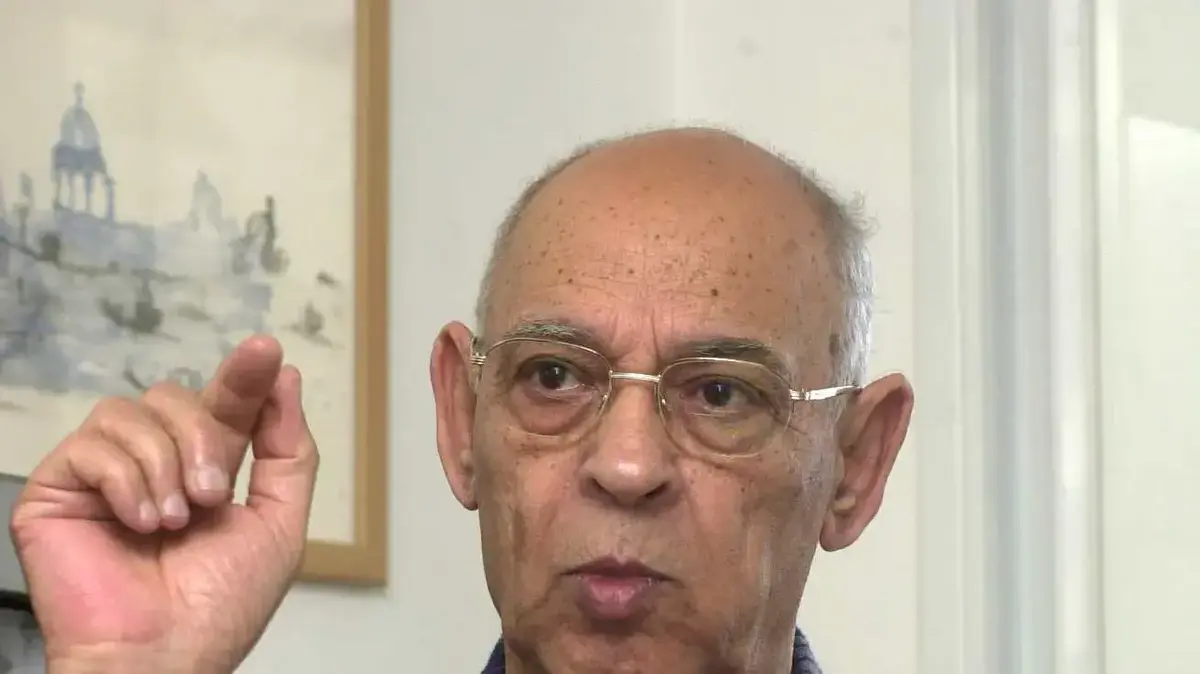Celebrations in Buenos Aires after Lionel Messi's goal against Mexico (Twitter)
In October 1957, the French philosopher and writer Albert Camus was sitting in his favorite cafe in Paris, when a messenger came to him and excitedly told him that he had won the Nobel Prize.
He was only 44 years old, the youngest winner ever.
Camus' personal achievement was seen in France as proof of the intellectual superiority of the country's younger generation, and local television asked to interview him.
The result was one of the strangest television interviews in history.
It was held at Parc de France, the largest football stadium in the country at the time, during a match by the local Racing Paris team.
Camus and the interviewer sat in the stands, surrounded by about 40,000 fans.
It wasn't trolling on the part of the new Nobel laureate, he just loved football and didn't want to miss the game.
A year before he won the Nobel he gave an interview to the alumni magazine of the University of Algiers, where he played for the local team as a goalkeeper, and said that "after so many years, in which the world offered me so many experiences, all I really know about morality and human commitment I I have to change in football."
In another interview he gave in 1959, less than a year before he died, he said that the theater halls and football fields were "my two real universities".
Camus's philosophy was concerned with the study of the absurd, and is there anything more absurd than 22 men running after a ball for 90 minutes in an imagined collective thought that it means that the ball crosses a white line arbitrarily drawn on a piece of grass?
But for Camus, the opposite is true.
Camus believed that what gives meaning to this life is the things you love without explanation.
irrationally
Not from the mind, but from within.
It took me a while to understand why I was celebrating.
Messi and Argentina lift the trophy (Photo: Reuters)
I remembered Kami when I found myself standing in front of the television with my three-year-old daughter, and we were celebrating together with a bunch of sweaty Argentines.
The girl was happy because she saw her father celebrating (and because they let her stay awake well past her anesthesia time) but it took me a while to understand why I was so excited.
irrationally
from the kishkas
Actually, what is there to understand here?
When was the last time you stood in front of the television and realized that you were witnessing history at the same time along with another billion people?
You can love these moments, you can not - history is a cold dog that does not make such calculations.
We saw live the Berlin Wall fall, the Israeli government announcing with astonishment the murder of Yitzhak Rabin, the two twin towers falling in New York.
Everyone who watched these moments realized in real time that these were historical moments, ones that will be remembered forever, just as felt by more than a billion people who watched the World Cup final match in Qatar last night.
This time, no one died.
No disaster happened.
One team won, the other lost.
The sun will also rise tomorrow in Paris, so to speak without any change, but the world will never be the same.
All of us, without exception, will forever remember where we were when we saw this game.
On the face of it, just a game.
"22 hooligans chasing a ball", as Prof. Yeshayahu Leibovich once defined it.
It turns out that even professors make mistakes sometimes.
The game enters this list of historical moments alongside Martin Luther King's "I have a dream" speech and Queen Elizabeth's funeral in London.
Three times Leo Messi kicked the ball into the net (although technically, once the ball stopped inside the goal without meeting the net) - and each time he increased the historic feeling of the moment.
True, Kylian Mbappe found the net even more times during the evening, but history is written by the winners, and this evening there was one winner: Argentina.
A proud nation of 45 million citizens, dwarfed for one evening in front of one citizen.
1.69 meters of talent.
The best footballer of all time proved that he is also the greatest of all time, and we were privileged to be extras in the history book he rewrote.
More in Walla!
Attackers in England: "Qatar enthroned Messi as if he belonged to them"
To the full article
After an evening like this, it's hard not to get your hair done (Photo: Reuters)
It is easy to underestimate football, the most popular sport in the world.
Sometimes it is unavoidable, certainly when you have to spend whole years watching the local version of the sport, known as "Israeli football".
There were terrible games in this World Cup as well.
Seven games ended in a draw.
To see Denmark and Tunisia playing not to absorb, and not to conquer - it's shameful.
The 0:0 between Mexico and Poland already felt like torture by the Shin Bet.
But football is more than conquests and exiles, and after such a Hollywood night it's hard not to brag about it.
Messi's script seems pre-written as a Netflix drama.
The boy from Argentina who suffered from growth problems, moved to Spain and became the greatest soccer player in Europe - but failed every time he came to play for his homeland's team.
The chants of "Why doesn't Messi appear for the team" continued even after he led the team to the World Cup final in 2014 and won the title of player of the tournament.
The claims "Messi cannot be considered the greatest of all time because he did not reach international achievements" continued even after he won the Copa America and Finalsima with Argentina.
Last night, he left no chance for the haters to find anything bad to say.
Arguing with his achievements seems like a disconnect from reality.
Lionel Messi (Photo: GettyImages)
The old argument between Messi and Ronaldo fans suddenly feels especially silly.
On a heroic night, in his last ever World Cup game, he scored twice in 120 tense minutes, adding the first penalty in a game-clinching duel.
He did it after an unimaginable comeback by France, the most talented team in the tournament.
It only made the story bigger.
It is not impossible that the light of the Hollywood ending is more suitable for Disney Plus than for Netflix.
The bottom line will remain the same.
Messi proved, to those who still had doubts, that he is the greatest this side of the millennium.
The greatest of his generation.
At this point, those who argue with these numbers and achievements have simply lost touch with reality.
Messi rose to the ranks of the super-temporary consensus alongside Michael Jordan, Nadia Comanche, Michael Phelps and Roger Federer.
Yes, there at the top, next to Diego and Pele.
Stop and think about the pressure Messi was under during the two penalties he kicked yesterday.
An entire career that drains into one kick.
A whole country is waiting for the good news to come out of his habit.
11 meters from the goal and another whole world watching and excited, among them tens of millions praying that he misses.
With all this burden on his shoulders he confidently approached, and rolled the ball lightly into the net.
Twice!
Out of excitement we almost missed that this is the last time we will see Messi in the blue-white uniform in the World Cup.
His kick in the penalty shootout was his last touch of the ball at the World Cup.
It was already a small history, just before the big history in which he got to lift the golden cup for the first time.
The last time.
Messi (Photo: GettyImages)
It's time to summarize not only the great moments of Messi and Argentina, but of an entire World Cup.
One held in winter instead of summer.
In a country that has nothing to do with football.
with a criminal disregard for human rights.
In unnecessary stadiums built in a country that doesn't need them, by foreign workers who worked under slave conditions, and 6,500 of them paid with their lives.
A World Cup in which it was forbidden to drink alcohol or take off your shirt.
A World Cup where a journalist was removed from the stands because he was wearing a shirt with the colors of the pride flag on it, and after a few days he mysteriously died.
And on the other hand, a World Cup that ended in one of the greatest finals in history, and some are already calling it the greatest game ever.
It would be absurd to ask if this game is worth killing 6,500 people for.
This is an unfair question with an illogical answer.
You know the answer in your bones.
Israel, as usual for the past 52 years, did not participate in the world football celebration, but that does not mean that there was no Israeli presence in Qatar - a country from which the funding for the world's most expensive football team and also for Hamas originates.
It's amazing that precisely in a country that Israelis can't normally enter at all, it seems that there were more blue-and-white journalists than those who cover the entire Israeli league.
The Israeli delegation to Qatar made headlines following several viral videos of Israeli journalists, as well as of a "comedian" who was forced to flee the country following an unsuccessful video that gained exposure in places he least wanted.
But there were also good sides to the coverage, most of which trickled down to the screen of our public broadcasting corporation.
More in Walla!
Hollywood movie: about the biggest World Cup final in the history of football
To the full article
The Israeli studio did not fall short of its counterparts in the world.
sometimes the opposite.
Tal Berman (photo: screenshot, here 11)
Almost 50 years after the immortal skit by the "Lol" gang, in which Uri Zohar vents his frustration on the television receiver after Israeli television chooses to broadcast opera instead of soccer (which this week received a color version), it seems that the revolution in public broadcasting is complete.
You will no longer see Opera on the screen of Kaan 11, maximum appearances by Noa Kirel - football, on the other hand, received a place of honor on the channel this month.
Although Israel did not participate in the tournament, this did not diminish the quality of the broadcasters for a moment.
In fact, it is not impossible that this was the most respected, professional and successful television coverage of an international event ever seen in Israel.
For moments it felt excessive.
An open studio in Qatar, field reports spread throughout the country and the stadiums, in-depth reports, commentaries from the studio, special programs by Guy Zohar, reports from the participating countries - and all this at the taxpayer's expense.
But that's exactly what professionalism looks like.
In a country that has become accustomed to journalists discussing politicians and gossiping for hours in open news studios during the day, it is a bit difficult to get used to the fact that the studio is replaced by professional experts who bring different angles, different interpretations and a lot of color and interest to a big event.
I watched a lot of broadcasters from around the world, the Israeli studio did not fall short of them in anything - and even vice versa.
All this before we talked about the impressive application of Kaan, which was launched at the same time as the World Cup.
The impressive professional mantle continued for the most part in the games themselves.
And yet there was a gap between transmission and transmission.
It was a pleasure to watch the broadcasts of Asharat Eini and Sharon Davidovich, who recently even wrote a book about the World Cups.
Yonatan Cohen and Assaf Cohen proved to be a winning duo, one that knows how to convey the experience of the game with unadulterated fun, without lowering the level of the broadcast.
It's hard to say the same about the broadcasts hosted by Amichai Spiegler or Nadav Jacobi, who seemed to compete with each other in volume during idle attacks.
Jacobi, who was chosen to broadcast last night's final match, is a veteran journalist and one of Israel's greatest experts on world football in general, and the World Cup in particular.
He also previously published a book on the history of the World Championship, and it is hard to believe that anyone would argue with the claim that he is a world-class scientist.
But something happens to Jacobi when he sits down in front of the microphone at the games.
Precisely from a person who loves the game so much and understands it, one would expect a little more emotion.
Every time the ball crosses the half, Jacoby starts to turn up the volume as if real drama is happening on the pitch - even when in reality nothing special is happening.
Anyone who has gone to a short bathroom break during a Jacobi game knows that horrible feeling, when it is impossible to understand the range of Jacobi's voice if he is broadcasting a rare goal, or just a random offside.
An Israeli friend who lives in the Czech Republic told me that he watched one of the games on local television, and could hear the shouts of Nadav Jacobi through the earphones of the Czech broadcaster.
Until now it is not clear to me whether he was joking or not, mainly because it sounds logical.
In any case, Jacobi's volume regulation is only one of the problems with his broadcasts.
While his erudition is undisputed, Yaakovi seems to have fallen in love with esoteric statistics and trivial trivia from Wikipedia.
More in Walla!
The epiphany: Messi is revealed as God in the eyes of the right fans
To the full article
enough shouting.
Nadav Jacobi (Photo: Fini Hamo)
Anyone who watches American sports knows the style, which is mainly suited to football and baseball, games where there are a lot of stoppages and dead moments in the game, where the TV broadcasters start telling anecdotes and comparing data.
In football there is no need for that.
At every moment someone holds the ball, passes, presses, grabs.
In the moments when the game stops, the television often goes back to reverse gears, in which the commentator comes into action.
There is no reason to "fill" playtime with chatter.
In fact, in moments when there is nothing to say, it is better to let the home crowd enjoy the atmosphere in the stadium and the songs of the fans - certainly at the height of the tension of overtime, instead of spitting out information that can be found on Google about the players on the grass who happen to have grown up in the city of Bondi in France.
Ironically, Jacoby, who does not give up any minor trivia detail, managed to miss the penalty given to the French in a situation of 2:3 to Argentina, which caught him quite by surprise.
Towards the end of the overtime I felt a strong longing for Yoram Arbel, a great sports leader that we have here, in my opinion.
How classy he was in his broadcasts.
The "Hallelujah" rolling after goals never took over the broadcast, but rather set the tone for the audience in the stadium.
Arbel knew how to say the right thing at the right time, a.k.a. "That's not how you build a wall", but no less - he knew when not to say anything. There is no silence with Jacobi. There are a lot of "wow", and statements that repeat themselves in a loop like "No could be” or “what we just saw.” Well, you're the broadcaster - tell us what we just saw, that's what you're there for.
When Yaacobi screams at the (excellent) commentator Uri Ozan: "Look at what he's doing, look at what he's doing," it's hard not to wonder if he thinks he's broadcasting on the radio and not on television.
We all see what he does, we don't need you to shout it at us non-stop.
Still, even Jacobi couldn't destroy history, certainly when the whole shell was so sugary.
Here is also an opportunity to compliment the entire supporting team.
The photographers, the editors, the sound people, the lighting, the makeup - everyone.
After a month where the corporate people entered our home almost every day in 4K quality, it was hard not to get carried away with pleasure.
At the end of the final I was not only happy for Messi but also for the TV strangers who entered our hearts.
Dor Hoffman, Abu-Leo and of course the great Uri Ozan, whose voice broke with tears at the end of the final when he told how much he loves football.
Not Argentina, not Messi - the game itself.
A stranger would not understand this, but it seems that for one night there were no strangers in the world.
After so many words had been spoken, Ozan found it difficult to speak.
The tears choked his throat, and we were all moved along with him.
Suffocate from happiness and marvel at the pleasure.
Those were illogical tears.
Not from the mind, but from the inside.
from the kishkas
culture
TV
TV review
Tags
Nadav Jacobi
Lionel Messi















